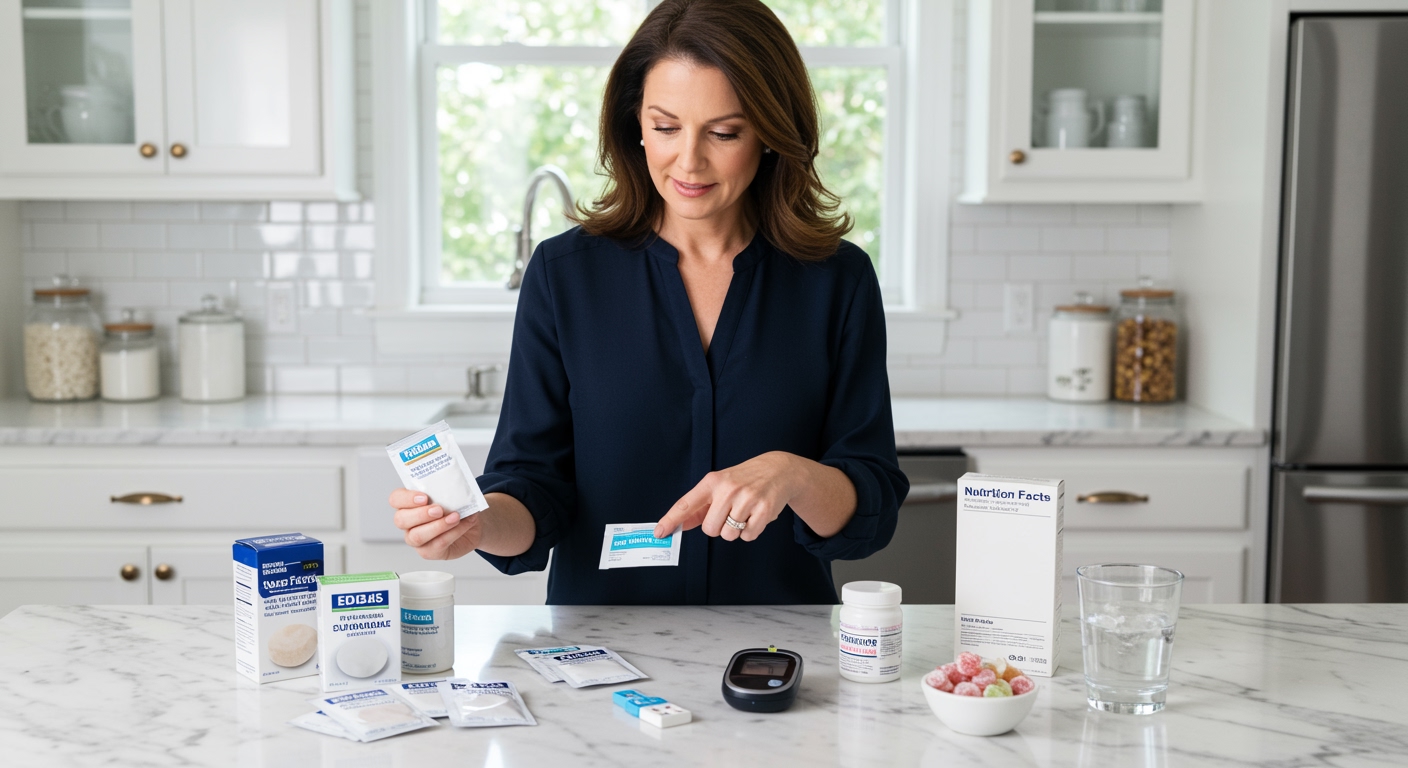✪ Key Takeaway: Sugar alcohols can be good for diabetes when used properly, but some types cause digestive issues and blood sugar spikes.
Introduction
You walk down the grocery aisle and see products labeled sugar-free, diabetic-friendly, and no added sugar.
You might be wondering if these sugar alcohol sweeteners are actually safe for your diabetes management or just another marketing trick.
Hi, I am Abdur, your nutrition coach and today I am going to explain everything you need to know about sugar alcohols and diabetes safety.
What Are Sugar Alcohols and How Do They Work?
Sugar alcohols are carbohydrates that taste sweet but contain fewer calories than regular sugar.
Your body processes them differently than regular sugar because they are only partially absorbed in your small intestine.
Common sugar alcohols include erythritol, xylitol, sorbitol, mannitol, and maltitol.
When you eat sugar alcohols, your digestive system breaks them down slowly, which means they cause a much smaller blood sugar spike compared to regular sugar.
This slower absorption happens because sugar alcohols have a different molecular structure that your digestive enzymes cannot process as efficiently as regular glucose.
✪ Fact: Sugar alcohols contain 0.2 to 3 calories per gram compared to 4 calories per gram in regular sugar.
Do Sugar Alcohols Raise Blood Sugar Levels?
Most sugar alcohols have a low glycemic index, which means they cause minimal blood sugar increases.
Erythritol has almost zero impact on blood glucose because your body absorbs only about 10% of it.
Xylitol and sorbitol cause slightly higher blood sugar responses, but still much lower than regular sugar.
Maltitol can cause more significant blood sugar spikes and should be used with caution if you have diabetes.
Your individual response to sugar alcohols depends on your insulin sensitivity, the amount consumed, and which specific sugar alcohol you choose.
Research shows that people with diabetes can use most sugar alcohols without major blood glucose concerns when consumed in moderate amounts.
✪ Pro Tip: Test your blood sugar 2 hours after eating sugar alcohols to understand your personal response.
Which Sugar Alcohols Are Best for Diabetes?
Erythritol stands out as the best choice for people with diabetes because it has virtually no impact on blood sugar or insulin levels.
It also causes fewer digestive problems compared to other sugar alcohols because most of it gets absorbed before reaching your large intestine.
Xylitol works well for diabetes management and offers additional benefits like preventing tooth decay.
Sorbitol and mannitol are acceptable options but may cause more digestive discomfort at higher doses.
Avoid maltitol if you have diabetes because it can raise blood sugar levels significantly, sometimes up to 50% as much as regular sugar.
Always check food labels carefully because many sugar-free products contain maltitol, which defeats the purpose of choosing a diabetes-friendly sweetener.
✪ Note: Erythritol is about 70% as sweet as sugar, so you may need to adjust recipes accordingly.
What Are the Side Effects You Should Know?
The most common side effect of sugar alcohols is digestive upset, including bloating, gas, and diarrhea.
This happens because unabsorbed sugar alcohols reach your large intestine where bacteria ferment them, producing gas and drawing water into your bowel.
Your tolerance level varies depending on which sugar alcohol you consume and how much you eat at one time.
Most people can handle up to 10 grams of erythritol without problems, but sorbitol and xylitol may cause issues at doses as low as 5-20 grams.
Some people experience headaches or a cooling sensation in their mouth when consuming certain sugar alcohols, particularly xylitol.
If you are new to sugar alcohols, start with small amounts and gradually increase to allow your digestive system to adapt.
✪ Pro Tip: Spread sugar alcohol consumption throughout the day rather than consuming large amounts at once.
How Should You Use Sugar Alcohols Safely?
Start with small portions to test your individual tolerance and blood sugar response.
Read ingredient lists carefully because many processed foods contain multiple types of sugar alcohols that can add up quickly.
Monitor your blood glucose levels when trying new sugar alcohol products to understand how they affect your diabetes management.
Choose whole foods and natural sweeteners when possible rather than relying heavily on processed sugar-free products.
Remember that sugar alcohols still contain calories and carbohydrates that need to be counted in your daily meal planning.
Work with your healthcare provider or registered dietitian to determine the best approach for incorporating sugar alcohols into your diabetes management plan.
✪ Note: Keep a food diary to track which sugar alcohols work best for your body and blood sugar control.
The Bottom Line
Sugar alcohols can be a valuable tool for diabetes management when used correctly and in moderation.
The best health choices are the ones you can sustain long-term without compromising your quality of life.
I would love to hear about your experiences with sugar alcohols or any questions you have about managing diabetes through nutrition in the comments below.
References
At NutritionCrown, we use quality and credible sources to ensure our content is accurate and trustworthy. Below are the sources referenced in creating this article:
- PubMed: Sugar alcohols and diabetes research
- Healthline: Sugar Alcohol and Diabetes
- PMC: Sugar alcohols metabolic effects
- Healthline: Sugar Alcohol vs Sugar





